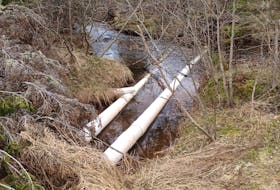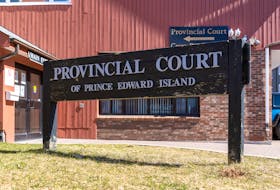As more and more Islanders work from home offices and students take part in online learning programs, poor internet quality in rural areas continues to be a point of contention for some.
"It can be really ridiculous. It took me months and months to get internet connected," said Claire Brown, a Fernwood resident.
Brown and her family moved to the Island about three years ago from England.
"We liked the community. We come from Kent, and this (area) reminds me of there," said Brown.
But having their home surrounded by tall trees in a remote area only made getting internet from a provider, in this case, Bell, harder.
Now, Brown is facing the challenges of working from home partnered with an increased load on the internet in the area.
"I can't work from home. I've been going into the office every now and again because I don't have internet that works. I pay $160, actually $180 now, for high-speed internet. I don't understand how it can continue," said Brown.
Brown works in the fisheries industry, which she describes as something that never sleeps. On top of that, she's been studying to take the Medical College Admission Test (or MCATS) because she's seen the impact of the doctor shortage on the Island.
The issue isn't singular to the Brown household.
"The whole area is struggling. I genuinely feel sorry for the community."
Brown and her neighbours have run speed tests on their internet recently. The numbers are well below the majority of Islanders' internet speeds of 50-megabit download and 10-megabit upload speeds.
The speeds are the minimum standard for broadband set by the Canadian Radio-television and Communications Commission.
"The whole area is struggling. I genuinely feel sorry for the community."
Brown said one set of numbers said the download speed was 13-megabits per second and upload speed was 87-kilobits per second.
She said the internet in her car works better than in her house
"There are days where I've gone into my car, that's sitting beside my house, and used its internet connection because I receive a better service."
Earlier this year, the government of P.E.I. announced a finalized deal with Bell and Xplornet to solve rural internet woes.
The agreements showed improved internet services in Island households with about 97 per cent of them reaching the minimum mandatory speeds.
Work is supposed to be completed by August of 2023.
Now, in light of the increased weight on internet service on the Island due to the coronavirus (COVID-19 strain) pandemic, the province is expanding the P.E.I. Broadband Fund (PEIBF) to support equipment and installation of Mi-Fi units and Wi-Fi signal boosters for businesses and the self-employed.

Chris MacFarlane, owner of Red Sands Internet, is no stranger to poor internet connections.
It was the frustration he felt when trying to work from his rural home that spurred him to start his own business.
MacFarlane purchases his bandwidth through Eastlink. With that bandwidth, MacFarlane has two spots where he can access fibre (the way data is transferred). From those two spots, the internet service is sent to about 12 different sites, which include antennas on utility poles and towers. On each of those towers/piles are sector antennas. It's those sector antennas that his clients connect their wireless router to and get a wireless internet connection.
He said the government's announcement is great but doesn't apply to him.
"Unfortunately it won't help me or any other providers as far as I am aware. I don't even qualify for the P.E.I. Broadband Fund because I would need to fund 50 per cent on my own. For instance, if I wanted to provide internet to a community such as Breadalbane and if it was going to cost me $250,000 to do it then the province would only provide $125,000. All of my available funds (lines of credit and credit cards) have been maxed out to do what I am doing now so there is no way I would be able to come up with my 50 per cent (to service another area)."
In an email to the Department of Economic Growth, Tourism and Culture, The Guardian asked if the current coronavirus pandemic would expedite the internet service plan to give Islanders better internet and what it meant to the timeline. The department was also asked what providers like MacFarlane can do if they don't qualify for the broadband fund.
In an email response, a spokeperson said the PEIBF provides grants of up to 50 per cent on eligible costs of hardware, and installation of access solutions. Government staff will assist in identifying potential options and alternatives once an application is received and with installation if requested. Solutions are not limited to internet mobile devices, (such as MiFi), but all solutions are to improve connectivity for those below a certain threshold level of service.
As for the projects with Bell and Xplornet, they continue as planned. Bell is continuing to deploy its project and Xplornet is in the design and planning phase.
Want to wade into the debate? Write a letter to the editor and email it to [email protected]. Be sure to include a name, address and daytime telephone number where the author can be contacted. Letters should be no more than 250 words.









